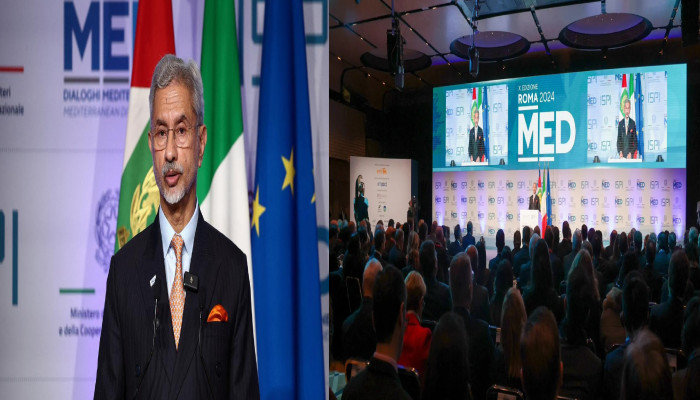India supports ceasefire in West Asia, advocates two-state solution: EAM Jaishankar
- In Reports
- 06:27 PM, Nov 25, 2024
- Myind Staff
India's External Affairs Minister, S. Jaishankar, stated on Monday that India supports an immediate ceasefire in West Asia. He emphasised India's backing for a long-term two-state solution while condemning terrorism, hostage-taking, and harm to civilians during military actions.
India views widespread civilian losses in military operations as intolerable, Jaishankar said during his speech at the 10th edition of the MED Mediterranean Dialogue in Rome. He also stressed that international humanitarian law cannot be disregarded. "In immediate terms, we should all support the ceasefire... In the longer term, it is imperative that the future of the Palestinian people be addressed. India favours a two-state solution," he said. Raising concern about the escalation of the West Asian conflict, Jaishankar stated that India has maintained constant contact at the highest levels with both Israel and Iran to advocate restraint and enhance communication.
India, like Italy, has a contingent in Lebanon as part of the United Nations Interim Force in Lebanon (UNIFIL). UNIFIL includes about 10,500 peacekeepers from 50 countries, with India contributing over 900 personnel. Additionally, Indian naval ships have been stationed in the Gulf of Aden and the northern Arabian Sea since last year to safeguard commercial shipping routes. "Given our capacity to engage various parties, we are always willing to contribute meaningfully to any international diplomatic endeavours," he said. Regarding the war between Russia and Ukraine, he stated that its continuation will have major, destabilising effects, notably on the Mediterranean.
"What is clear is that no solution is going to emerge from the battlefield. India has consistently held the view that disputes in this era cannot be settled by war. There must be a return to dialogue and diplomacy. The sooner, the better. This is a widespread sentiment in the world today, especially in the Global South," he stated. Prime Minister Narendra Modi has been directly interacting with the leaders of Russia and Ukraine since June. He has visited both Moscow and Kyiv in pursuit of this goal, and top officials are still in constant communication. "We firmly believe that those who have the ability to explore finding common ground must step up to that responsibility," he added.
He explained that supply chains are unstable and maritime connectivity is disrupted due to these two conflicts. On the positive side, he mentioned that building a closer and stronger bond between India and the Mediterranean would benefit both regions greatly. "Our annual trade with the Mediterranean nations is about USD 80 billion. We have a diaspora of 460,000, and about 40% of that is in Italy. Our key interests are in fertilisers, energy, water, technology, diamonds, defence and cyber," he said. India's political ties with the Mediterranean region are strong, and defence cooperation is growing with more joint exercises and exchanges.
The Mediterranean offers both opportunities and challenges in a world full of uncertainties. A key development in the relationship is the focus on connectivity. The India-Middle East-Europe Economic Corridor (IMEC), announced last September, has the potential to be transformative. He also discussed the I2U2 alliance, which consists of the US, Israel, the UAE, and India, and stated that it is anticipated to become more active in the future. While the ongoing conflict in West Asia has created challenges, progress on the eastern segment of the IMEC, particularly between India, the UAE, and Saudi Arabia, continues steadily.
India's trade with the Gulf region amounts to $160–180 billion annually, while trade with the rest of the Middle East and North Africa (MENA) region adds another $20 billion. Over nine million Indians live and work in the Middle East, contributing to sectors like energy, technology, industrial projects, and services. The region also shares deep historical, cultural, and security ties with India. Jaishankar had earlier met with British Foreign Secretary David Lammy to discuss continuing developments in Indo-Pacific and West Asia, as well as expanding cooperation in technology, renewable energy, trade, and mobility. "Started the day by meeting FS @DavidLammy of UK, in Rome today. Appreciate the steady momentum in India UK Comprehensive Strategic Partnership," he said in a post on X.
The minister said to have discussed current events in the Indo-Pacific and West Asia, as well as expanding collaboration in the areas of technology, renewable energy, trade, and mobility. India has been invited as a guest country to attend the G7 Foreign Ministers' Meeting in Fiuggi, and Jaishankar, who arrived here on Sunday for a three-day visit, will take part in the outreach session. During the tour, he is also anticipated to have bilateral talks and meet with his counterparts from other participating countries in the G7-related events.







Comments